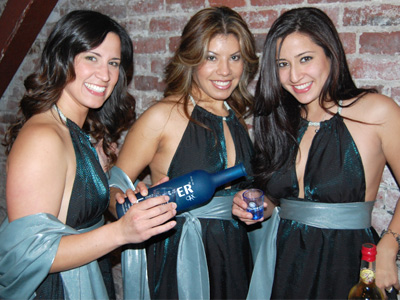
A large and lively crowd of people gathered at Tres Agaves Mexican Restaurant in San Francisco recently to join in an ancient tradition – drinking mezcal. The Consulate General of Mexico and Mex-Cal, Inc. hosted more than one hundred people at the official introduction of mezcal to California as a Product
with Denomination of Origin. Like tequila or champagne, mezcal can be produced only in areas where the government has deemed it legal. By Mexican law, the only states allowed to produce mezcal are Oaxaca, Guerrero, Guanajuato, San Luis Potosi, Zacatecas, Durango and Tamaulipas. Mezcal from each of these states was sampled by event attendees, many of whom were likely having their first taste of both the strong flavor mezcal is known for and the smooth and complex taste similar to quality tequilas.Though mezcal is the father of all tequilas, it is often perceived as a lower quality drink. But people who know the truth about mezcal today are enjoying its robust taste and complex nature. True fans of the drink enjoy it straight, while others take it in a mixed cocktail.
“People who ask for mezcal like it for its taste – it’s more rich, flavorful and intense than tequila,” says Ivan Garcia, bar manager at Cocina Poblana restaurant in Oakland. “It’s more intense and smoky because the agave is cooked on a wood fire,” he says. “A lot of people say it’s stronger than tequila but it’s not – it’s 80 proof, just like tequila. Ivan estimates that one out of thirty customers at the restaurant ask for mezcal.
The Consejo Mexicano de Productores de Maguey Mezcal, A.C. was also represented at the event in San Francisco. “We are working with a social aspect,” says Francisco Javier Perez Cruz. “We work with producers that live in the Mexican sierras and we want to help them to sell their mezcal - that is why we are here,” he adds. “Mezcal has a lot of tradition, history and culture - it is a unique drink that deserves to be in the best places. We are promoting mezcal to the world.”
Also at the event was Angelica Cruz Barrera, director in the Secretaria de Agricultura, Ganadería, Desarrollo Rural, Pesca y Alimentación (SAGARPA) en México. “It has an ancient origen, more of 400 years ago and mezcal is a drink that is very appreciated in Mexico,” says Angelica. “Meszal can be produced with 30 different plants of agave, which give different textures, aromas, and tastes, making it special and different,” she says.
“We want to bring the mezcal to U.S., which is getting fifty percent of the mezcal that is exported from Mexico, adds Angelica. “We are looking for companies that want to distribute the mezcal.”
Graded as a Premium and Super Premium alcoholic beverage, mezcal is gaining greater prestige and recognition around the world, according to people in the industry.
While producers, promoters, and the Mexican government work to increase demand for mezcal, the awareness problem seems to be huge. Mike Tito has been bartending at Tito’s Restaurant in San Leandro for more than 30 years. He says that mezcal used to be more popular. “A lot more people used to ask for it twenty years ago,” says Mike. “We have it on our menu, but people don’t really order it,” he adds. Mike said he feels that the older generation probably knew about mezcal more and that more people today likely have wrong perceptions about the drink. “There are good mezcals but people don’t know that,” he says.
With magical and mystical qualities, mezcal has been exalted by writers and artists as part of the essence of Mexico. Writer Lance Cutler wrote, “Fine mezcal, made naturally from 100% agave, is probably the purest, most traditional spirit available on planet Earth. Mezcal smells like history. It tastes like wonder and superstition.”

